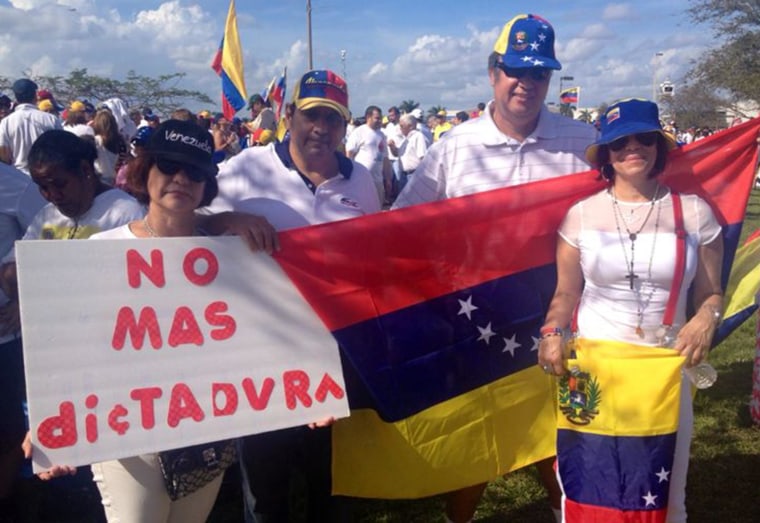President Obama’s executive orders declaring Venezuela a national emergency and a threat to national security were met with mixed emotions by the Venezuelan community living abroad in the United States who strongly oppose the Maduro government. Some said it sent a clear, decisive message; others said it wasn't enough.
“A lot of us in the Venezuelan community, although we are happy that he sanctioned some people, we are still not happy that he hasn’t sanctioned everyone,” said Gregory Bracho, 39, of Toledo, OH, referring to the president.
On Monday morning, the White House announced that the U.S. government would be imposing sanctions on seven Venezuelan officials identified in connection with human rights violations, persecution of political opponents, and involvement in significant public corruption – to name some of the charges.
The individuals on this list, which included the director general of the country's national intelligence service and the director of the national police, would have “their property and interests in property in the United States blocked or frozen”; business transactions with U.S. citizens blocked, and entry into the country denied immediately.
Bracho is part of a group of Venezuelans that began rallying Congress last April. Their work, he said, eventually lead to the signing of the Venezuelan Defense of Human Rights and Civil Society Act of 2014 on Dec. 18. Introduced by Senator Bob Menendez of New Jersey, the bill holds a much-longer list of Venezuelan officials.
“It’s a good step but we want more,” said the activist.
"It's a good first step but we want more," said a U.S. Venezuelan who has been actively rallying Congress.
As news of the U.S. actions broke Monday, Lorenzo Di Stefano said he scrambled to reach out to the media. He owns El Arepazo 2 in Doral, Florida, a small Venezuelan restaurant on the corner of a gas station that has become the center for Venezuelan politics in the United States.
A press conference held that day drew nearly 50 people in attendance, he said.
A digital ticker placed inside Di Stefano's business has kept track of the days it has taken the Obama administration to enforce the Dec. 18 gain, he said. By Monday, that number stood at 82 and a sense of uncertainty reigned, he said.
“We were left surprised when Obama declared the situation in Venezuela a national security issue,” Di Stefano said in an interview over the phone with NBC News.
“It’s a happy moment to know someone outside of Venezuela can finally admit that there’s a problem,” he added.
His long-time friend and colleague, Ernesto Ackerman of IVAC, which stands for the Independent Venezuelan American Citizen, echoed this sentiment when he told NBC South Florida the organization had been working to alert Washington of this for the past 15 years.
Carla Bustillos, 35 of Alexandria, Virginia, agreed. “This is something that Venezuelan human rights activists have worked very hard for, to get noticed.”
Well-versed on the issues and very involved in the Venezuelan community in the Washington, D.C. area, she said she expected the Venezuelan government to retaliate and feared it would find a way to twist the announcement for its own benefit.
“In my opinion, I think it will lift the morale of Venezuelans and it will trigger more negative behavior on behalf of the Maduro government,” she added.
Others think Obama's move sends a very clear message.
Because the sanctions strictly focus on the government and spare the Venezuelan people and its dwindling economy, Mireya Granadillo, 56, of Miami, Fla. –like many of her counterparts – thinks it was an important action.
“It’s a smart move from the Obama administration, to alert them and let them know that they will not continue to get away with it. It let’s them know they’re not immune,” she said.
“Now if you ask me if this will have a positive effect on the country, I would say ‘I’m not too sure,’” added Granadillo, who said her biggest concern is the continued isolation the Venezuelan people continue to be subjected to.
The fact that Venezuela's government is being questioned by another country holding its leaders accountable makes a Texas college student hopeful.
“Media censorship is a big problem in our country, and unless you have access to the Internet or to a smartphone, you’re very limited to really knowing what’s happening outside of what the government wants you know,” Granadillo added.
Carlos Ruiz, a 22-year-old Biochemistry student at the University of Texas-Austin, said his family sees the U.S. actions as a silver lining.
“They see it as a breath of fresh air,” he said.
The fact that Venezuela's government is being questioned by another country holding its leaders accountable makes him hopeful, said Ruiz.
He cites the Feb. 24 fatal shooting of a 14-year-old schoolboy during an anti-Maduro rally in the city of San Cristobal as an example of the government’s disregard for its opponents. The teen was shot by a police officer; the officer was charged and the government condemned the shooting.
“People will be brought to justice for the senseless deaths to the innocents,” said Ruiz.
--Vanessa Alvarez
